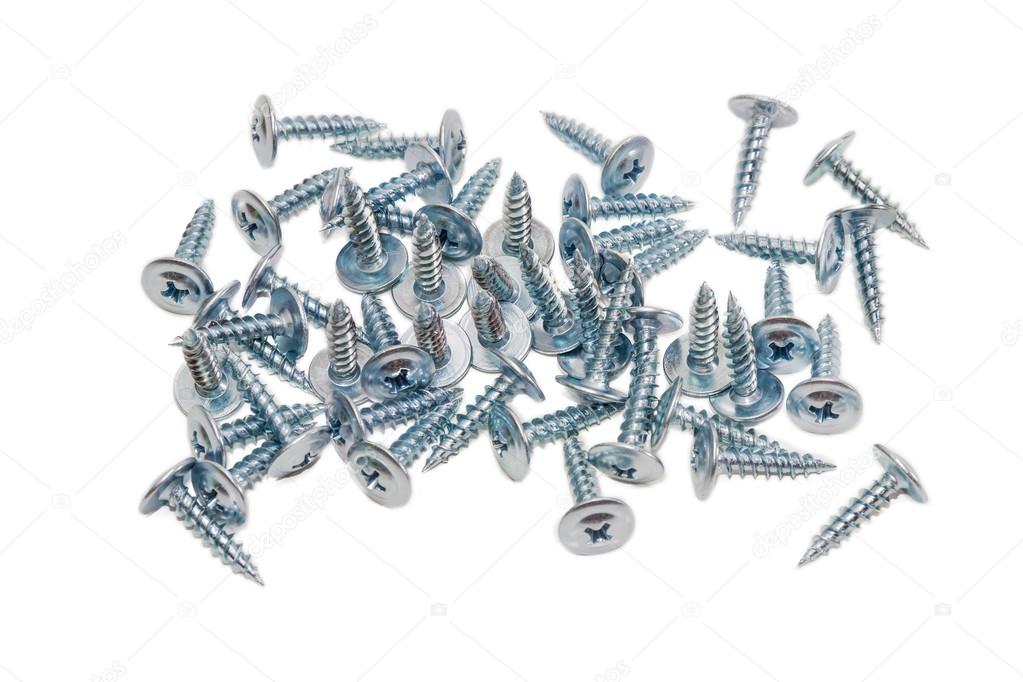Finding the Best Sheet-Metal Screws: A Comprehensive Review
A sheet-metal screw is an essential fasteners widely used in various construction, DIY, and repair projects. Their sharp threads and pointed tips make them ideal for securely fastening metal sheets, thin plastics, and other materials. With countless options available on the market, it can be challenging to find the best sheet metal screws for your specific needs. To help you make an informed decision, we’ve compiled a list of the five best sheet-metal screws available on Amazon. We’ll provide a brief product summary for each, along with their pros and cons, so you can choose the perfect screws for your projects.
To see our related product guide article, click here.
Top Picks for Best Sheet-Metal Screws
#8 x 1/2″ Stainless Steel Sheet Metal Screws, Phillips Head
This pack of #8 x 1/2″ sheet metal screws is made from high-quality stainless steel, offering excellent corrosion resistance and durability. The Phillips head design ensures easy and reliable installation, making them suitable for a wide range of applications, both indoor and outdoor.
Pros:
- Stainless steel construction resists rust and corrosion.
- Sharp threading for quick and efficient fastening.
- Suitable for outdoor use and marine applications.
- Phillips head design is common and easy to work with.
Cons:
- Some users may prefer different head types (e.g., hex) for specific projects.
#10 x 1″ Hex Washer Head Sheet-Metal Screws, Zinc Plated
These #10 x 1″ sheet metal screws feature a hex washer head design that provides a large bearing surface, reducing the risk of over-tightening and damaging materials. The zinc-plated finish enhances corrosion resistance and adds an appealing look to your projects.
Pros:
- Hex washer head distributes load and prevents over-tightening.
- Zinc plating improves corrosion resistance.
- Versatile screws suitable for a wide range of materials.
- Ideal for projects where aesthetics matter.
Cons:
- May not be as corrosion-resistant as stainless steel screws.
- Not recommended for highly demanding outdoor applications.
#6 x 3/4″ Pan Head Sheet-Metal Screws, Zinc Plated
If you’re looking for smaller sheet metal screws, this pack of #6 x 3/4″ pan head screws might be the perfect fit. The pan head design offers a low-profile look and ensures a flush fit when fastening materials, making them ideal for applications where appearance is important.
Pros:
- Pan head provides a flush fit and a clean appearance.
- Zinc plating enhances corrosion resistance.
- Suitable for securing thin materials and light-duty projects.
- Can be used for various home improvement tasks.
Cons:
- Not recommended for heavy-duty applications.
- May not be suitable for projects requiring high tensile strength.
#12 x 1-1/2″ Self-Tapping Sheet-Metal Screws
These #12 x 1-1/2″ sheet metal screws feature a self-tapping design, eliminating the need for pre-drilling pilot holes. The Sheet-Metal screws are made with high quality 304 stainless steel which adds protection against corrosion and provides a sleek, professional appearance.
Pros:
- Self-tapping design saves time and effort during installation.
- Ideal for projects involving thicker metal sheets.
- High tensile strength for more demanding applications.
Cons:
- The self-tapping feature may not be suitable for certain thin or delicate materials.
#14 x 1-1/4″ Hex Head Sheet Metal Screws, 18-8 Stainless Steel
For heavy-duty applications, these #14 x 1-1/4″ hex head sheet metal screws made from 18-8 stainless steel are an excellent choice. The large hex head allows for easy installation and provides a high clamping force, ensuring a secure and long-lasting hold.
Pros:
- Hex head provides a strong grip and resists slipping during installation.
- 18-8 stainless steel offers superior corrosion resistance.
- Suitable for demanding outdoor and marine applications.
- Ideal for securing thicker metal sheets and heavy materials.
Cons:
- The large size may not be suitable for smaller-scale projects.
- May be relatively expensive compared to smaller screws.
When choosing sheet metal screws, it’s crucial to consider the specific requirements of your project. Whether you prioritize corrosion resistance, aesthetics, or self-tapping capabilities, the list above covers the best options available on Amazon. Always make sure to assess your project’s needs and select the appropriate screw type and size to achieve optimal results.
What Should You Look for in a Sheet-Metal Screw?
When looking for a sheet-metal screw, there are several key factors to consider to ensure you choose the right one for your specific project. Here are the essential aspects to look for:
- Material: Sheet-metal screws are available in various materials, including stainless steel, carbon steel, zinc-plated steel, and more. The material determines the screw’s corrosion resistance, strength, and durability. For outdoor or marine applications, stainless steel screws are an excellent choice due to their superior rust resistance. For indoor or non-demanding projects, zinc-plated or carbon steel screws may suffice.
- Size and Length: Sheet-metal screws come in different sizes, typically indicated by a number, such as #6, #8, #10, etc. The higher the number, the larger the screw. Additionally, consider the screw’s length, which should be suitable for the material’s thickness you are fastening. Using a screw that is too short may not provide sufficient hold, while one that is too long might cause damage or protrude on the other side.
- Head Type: Sheet-metal screws come with various head types, including Phillips, flat, pan, hex washer, and more. The head type affects the screw’s appearance, the tool needed for installation, and the screw’s holding capacity. For instance, a hex washer head provides a larger bearing surface and reduces the risk of over-tightening.
- Drive Type: The drive type refers to the slot or recess on the screw head that accommodates the screwdriver bit. Common drive types include Phillips, slotted, Torx, and square drives. It’s essential to choose a drive type that matches the corresponding screwdriver or drill bit you have.
- Thread Type: Sheet-metal screws have sharp threads designed for easy and efficient penetration into metal and other thin materials. Ensure that the thread type is appropriate for the material you are working with, as certain materials may require specific thread patterns.
- Self-Tapping Capability: Some sheet-metal screws are self-tapping, meaning they have a pointy tip that allows them to create their own threads as they are driven into the material. This feature saves time and effort since you won’t need to pre-drill pilot holes.
- Corrosion Resistance: Consider the environment in which the screw will be used. If the project is exposed to moisture or outdoor elements, opting for screws with excellent corrosion resistance, such as stainless steel or coated screws, is crucial to ensure long-lasting performance.
- Load-Bearing Capacity: For heavy-duty applications or projects involving significant weight, choose sheet-metal screws with high load-bearing capacity and tensile strength.
- Application: Determine the specific application of the screw. Will you be using it for metal-to-metal fastening, attaching metal to wood, or securing thin materials? Different projects may require different types of screws to achieve optimal results.
- Quantity and Price: Consider the quantity of screws needed for your project and compare prices to ensure you’re getting a good value for the number of screws you’re purchasing.
By carefully considering these factors, you can confidently select the right sheet-metal screws that meet the requirements of your project, providing a secure and reliable fastening solution.
Frequently Asked Questions
Which sheet-metal screw won’t rust?
Sheet-metal screws made from certain materials are more resistant to rust and corrosion. If you’re looking for sheet-metal screws that don’t rust, your best options are those made from stainless steel or coated with anti-corrosion finishes. Here are the two main types of sheet-metal screws known for their rust-resistant properties:
- Stainless Steel Sheet-Metal Screws: Stainless steel screws are highly popular due to their exceptional rust and corrosion resistance. They are made from an alloy of steel and chromium, which forms a passive protective layer on the surface when exposed to oxygen. This layer prevents the underlying metal from corroding, even when exposed to moisture and harsh environmental conditions. Stainless steel sheet-metal screws are suitable for both indoor and outdoor applications, including marine environments.
- Zinc-Plated or Coated Sheet-Metal Screws: Zinc-plated sheet-metal screws offer improved corrosion resistance compared to regular carbon steel screws. Zinc plating provides a protective barrier against rust and can withstand mild to moderate environmental exposure. There are also other types of coatings, such as black oxide or galvanized coatings, which offer additional anti-corrosion properties.
While stainless steel screws provide the highest level of rust resistance, zinc-plated or coated screws are a more budget-friendly alternative for projects that are not constantly exposed to extreme conditions.
It’s essential to consider the specific application and environment where the screws will be used. For outdoor and marine applications, stainless steel screws are recommended for their superior durability and rust resistance. For indoor projects or applications with less exposure to moisture, zinc-plated or coated sheet-metal screws can provide adequate protection against rust while being more cost-effective.
What is the difference between a type A and type B sheet-metal screw?
Type A and Type B sheet-metal screws are two different types of screws used for fastening metal sheets and other thin materials. The main difference between them lies in their thread design, which affects their specific applications and installation methods:
Type A Sheet-Metal Screw:
- Thread Design: Type A screws have a thread design that features coarse, spaced threads with a blunt point. The threads are wider apart, allowing for faster insertion and easy penetration into the material.
- Installation: Type A screws require a pre-drilled pilot hole before installation. The pilot hole should be slightly smaller in diameter than the screw’s outer diameter to ensure proper engagement and holding power.
- Applications: Type A screws are primarily used for fastening metal-to-metal applications. They are well-suited for projects where precise positioning is necessary, as the pilot hole allows for better alignment.
- Materials: Type A screws are suitable for softer materials like aluminum and plastic, where the wider-spaced threads help prevent the material from getting stripped.
Type B Sheet-Metal Screw:
- Thread Design: Type B screws have a thread design that features finer, closer-spaced threads with a sharper, pointed tip. The closer threads offer better grip and holding power in the material.
- Installation: Type B screws are self-tapping and do not require a pre-drilled pilot hole. The sharp, pointed tip allows them to create their own threads as they are driven into the material.
- Applications: Type B screws are commonly used for fastening metal to wood or metal to plastic applications. The self-tapping feature makes them convenient and efficient for quick installations.
- Materials: Type B screws are suitable for a wider range of materials, including metals, plastics, and wood.
In summary, the primary difference between Type A and Type B sheet-metal screws lies in their thread design and installation methods. Type A screws have coarser threads and require a pre-drilled pilot hole, making them suitable for metal-to-metal applications. On the other hand, Type B screws have finer threads and are self-tapping, making them ideal for metal-to-wood and metal-to-plastic applications, where a pilot hole is not necessary. When choosing between Type A and Type B screws, consider the specific materials and application requirements of your project.
What is the best screw to attach metal to metal?
The best screw to attach metal to metal depends on the specific application and the type of metal being used. In general, for metal-to-metal fastening, self-drilling or self-tapping screws are highly recommended. These screws have a pointed tip and sharp threads that can create their own pilot holes and threads as they are driven into the metal, making the installation process quicker and more convenient.
The most common and effective types of screws for metal-to-metal applications are:
- Stainless Steel Self-Drilling Screws: Stainless steel self-drilling screws are ideal for attaching metal to metal, especially in outdoor or corrosive environments. They offer excellent rust and corrosion resistance, ensuring a long-lasting and secure connection.
- Zinc-Plated Self-Drilling Screws: Zinc-plated self-drilling screws provide good corrosion resistance at a more budget-friendly price point compared to stainless steel. They are suitable for indoor applications or projects with less exposure to harsh environmental conditions.
- Hex Washer Head Self-Drilling Screws: Self-drilling screws with a hex washer head provide a larger bearing surface and reduce the risk of over-tightening, making them suitable for projects where a flush, even surface is essential.
- Pan Head Self-Tapping Screws: Pan head self-tapping screws are another good option for metal-to-metal applications. They offer a low-profile look and are suitable for projects where appearance is important.
When choosing the best screw for metal-to-metal fastening, consider the type of metal you are working with, the thickness of the materials, the environment in which the connection will be exposed, and the load-bearing requirements of your project.
It’s also crucial to use the correct size and length of screws to ensure a secure and stable connection. Always follow the manufacturer’s guidelines and recommendations for the specific screws you are using to achieve the best results. Additionally, using a high-quality screwdriver or drill with the appropriate torque settings is essential to avoid damaging the screws or the materials during installation.
What is the strongest metal for screws?
The strength of a screw depends not only on the material it is made of but also on its design and size. However, when it comes to the material used in screws, alloy steel is one of the strongest options available. Alloy steel is a type of steel that is alloyed with various elements to enhance its mechanical properties, including strength, hardness, and toughness.
The term “alloy steel” encompasses a wide range of steel compositions, each with unique properties. Some common alloying elements used in alloy steel screws include chromium, molybdenum, vanadium, nickel, and manganese. The addition of these elements improves the screw’s strength and performance, making them suitable for demanding applications.
Stainless steel is also a strong material for screws, particularly when it comes to corrosion resistance. Stainless steel screws are made from an alloy of steel and chromium, and they are highly popular for outdoor and marine applications where rust and corrosion resistance are essential.
In addition to the material, the screw’s design and size play a crucial role in its strength. Larger screws with thicker diameters generally have higher load-bearing capacities and greater tensile strength.
It’s essential to choose the right screw material and size based on the specific application and load requirements of your project. For critical applications or projects with high demands, consulting with a professional or engineer can help ensure the proper selection of the strongest and most suitable screws.
editor's pick
news via inbox
Stay one step ahead with exclusive tips, guides, and offers delivered directly to your inbox.
Sign up for our newsletter and elevate your home improvement game today!







